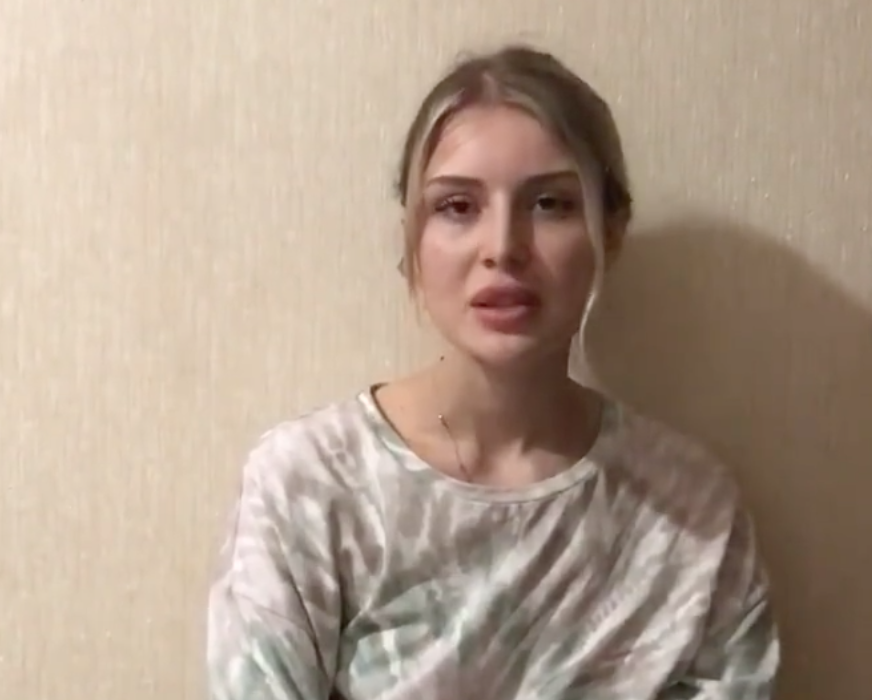Police 'abducts' Chechen woman from shelter after her attempt to escape abuse
Chechen woman abducted from shelter, returned to her family
A Chechen woman who fled the abuse was kidnapped from a shelter and returned back to her family. Khalimat Taramova, the daughter of an official closely tied with local authorities, had previously complained about regular beatings and asked for protection. The young woman has now been returned to her family and human rights activists fear for her life.
The state-run television company Grozny, which broadcasts in the Chechen Republic of Russia, published an extensive report on June 14 about Khalimat Taramova, a girl who had been reported several days earlier as being kidnapped by police from a shelter in the neighboring republic of Dagestan.
Who is Khalimat Taramova
A video that circulated on social media had reported that Taramova left home due to regular beatings.
Human rights activists from the Russian LGBT Network told media that Khalimat Taramova turned to them for protection, complaining of threats due to her sexual orientation.
Dagestani and Chechen security forces attacked a shelter for victims of domestic violence in Makhachkala, Dagestan on June 10. They detained Taramova, her friend Anna Manylova and other women in the shelter. Taramova was taken to Chechnya, her friend was dropped off on the way. On the same day, Taramova was handed over to her relatives and any traces of her were lost.
Russian media reported that Khalimat Taramova is the daughter of a former Chechen official Ayub Taramov, a person with close ties to the Chechen leadership. Taramov served as head of the Chechen administration apparatus and worked as the first deputy minister of housing and communal services of the republic.

Chechen media reports
A 35-minute coverage of the Grozny TV company (the main mouthpiece of the pro-government propaganda in Chechnya) provided a completely different account of what happened with Taramova.
The authors of the report said that Taramova was “used to striking a blow at the traditional foundations of the Chechen people”. The TV channel recorded an interview with a girl who said that she was not in danger. “I am with my family. I’m fine. No one is pressuring me, everyone is supporting and comforting me”, Taramova said in her interview.
Taramova also said that she did not remember how she ended up in the shelter in Dagestan. “I don’t know how I got there – everything seems some blurry. I don’t remember”. The authors of the report emphasize that “the girl has learned her lesson with a bitter experience, and henceforth promises not to get involved with dubious personalities who, posing as psychologists, deceived her and almost ruined her whole life”.
The report also shows interviews with the girl’s relatives and doctors who state that Taramova has mental health problems.
Civil society and international organizations’ response
The European Court of Human Rights (ECHR), to which Russian human rights defenders appealed, demanded information about Taramova from Russia. The ECHR is interested in whether Taramova was detained, on what grounds, was a lawyer allowed to visit her, was Taramova really taken to Chechnya and, if so, by whom – private individuals or security officials, whether she was detained in Chechnya and, if so, on what grounds.
The life and health of Taramova is in danger, says Svetlana Gannushkina, a Russian human rights activist, head of the Civic Assistance Committee.
“How will she be forced to admit that she does not belong to the LGBT community, what evidence will be required from her, is still unclear”, she said in an interview with the Caucasian Knot.
If it were not for human rights activists and the media, who draw the public’s attention to Taramova’s case, the end of the story could be tragic, Gannushkina believes.
Chechen authorities’ statements about Taramova being ill and having to undergo treatment were interpreted by the human rights activist as the desire to portray the young woman as being ‘abnormal’: “This has already happened. In Chechnya, when they talk about health problems, they mean mental health”, Gannushkina said.
The fears expressed by Gannushkina are also shared by the lawyer of the LGBT Coming Out initiative group Ksenia Mikhailova.
“The destruction of the women’s shelter by the security forces is an unprecedented case, but, unfortunately, such things often happen in certain regions of Russia, not in the central regions”, she said in an interview with Kavkaz. Realities.
Mikhailova does not exclude the possibility of Khalimat Taramova getting killed by her own relatives because she does not correspond to their ideas about traditional morality, as such murders still take place in Chechnya, Mikhailova emphasized.



















